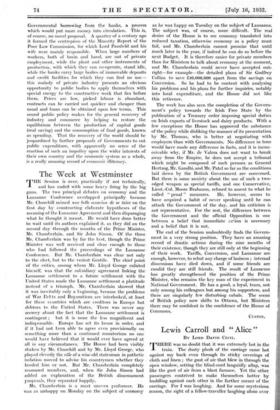The Week at Westminster
THE Session is over, practically if not technically, and has ended with some heavy firing by the big guns. The two principal debates on economy and the Lausanne Conference overlapped principally because Mr. Churchill missed tine belle occasion de se taire on the first day by constructing elaborate hypotheses of the meaning of the Lausanne Agreement and then disparaging what he thought it meant. He would have done better to wait until its authors explained it, as they did on the second day through the mouths of the Prime Minister, Mr. Chamberlain, and Sir John Simon. Of the three Mr. Chamberlain was by far the best, though the Prime Minister was well received and clear enough to those who had followed the proceedings of the Lausanne Conference. But Mr. Chamberlain was clear not only to the elect, but to the veriest Gentile. The chief point of the critics, among whom Mr. Lloyd George enlisted himself, was that the subsidiary agreement linking the Lausanne settlement to a future settlement with the United States made the Lausanne settlement a platitude instead of a triumph. Mr. Chamberlain showed that it was inevitably only a beginning, because the problems of War Debts and Reparations are interlocked, at least for those countries which are creditors in Europe but debtors to the United States. There was never any secrecy about the fact that the Lausanne settlement is contingent ; but it is none the less magnificent and indispensable. Europe has set its house in order, and if it had not been able to agree even provisionally on something more than a continued moratorium no one would have believed that it would ever have agreed at all in any circumstances. The House had been visibly shaken by Mr. Churchill and by Mr. Lloyd George, who played cleverly the r6le of a wise old statesman in pathetic isolation moved to advise his countrymen whether they heeded him or not. But Mr. Chamberlain completely reassured members, and, when Sir John Simon had added an explanation of the British disarmament proposals, they separated happily.
Mr. Chamberlain is a most uneven performer. He was as unhappy on Monday on the subject of economy as he was happy on Tuesday on the subject of Lausanne. The subject was, of course, more difficult. The real desire of the House is to see economy translated into reduced taxation, otherwise economy as a policy must fail, and Mr. Chamberlain cannot promise that until much later in the year, if indeed he can do so before the next Budget. It is therefore easier for private members than for Ministers to talk about economy at the moment, and Mr. Chamberlain could never have accepted out-, right—for example—the detailed plans of Sir Godfrey Collins to save £40,000,000 apart from the savings on Conversion. So he had to be content with analysing his problems and his plans for further inquiries, notably into local expenditure, and the House did not like this reticence.
The week has also seen the Completion of the Govern- ment's policy towards the Irish Free State by the publication of a Treasury order imposing special duties on Irish exports of livestock and dairy products. With a few exceptions the House has approved the substance of the policy while disliking the manner of its presentation by Mr. Thomas, who is better at negotiating with employers than with Governments. No difference in tone would have made any difference in facts, and it is incon- ceivable why, if Mr. de Valera does not want to break away from the Empire, he does not accept a tribunal which might be composed of such persons as General Hertzog, Mr. Gandhi, and Mr. Patel so far as the conditions laid down by the British Government are concerned. But there is some anxiety about the use of such a two- edged weapon as special tariffs, and one Conservative, Lieut.-Col. Moore Brabazon, refused to assent to what he called " penal " measures. He, however, seems to have acquired a habit of never speaking until he can attack the Government of the day, and his criticism is not representative. For the rest, the difference between the Government and the official Opposition is one between a belief that immediate action is necessary and a belief that it is not.
The end of the Session undoubtedly finds the Govern- ment in a very strong position. They have an amazing record of drastic actions during the nine months of their existence, though they are still only at the beginning of their work. Tariffs, Conversion, and Lausanne are enough, however, to rebut any charge of laziness ; internal dissensions have died down, and if some friends are candid they are still friends. The result of Lausanne has greatly strengthened the position of the Prime Minister, who remains the key man of the experiment in.
National Government. He has a good, a loyal, team, not only among his colleagues but .among his supporters, and there are singularly few disturbing cabals. The scene of British policy now shifts to Ottawa, but Ministers there may be confident in the confidence of the House of Commons.
CUSTOS.


































 Previous page
Previous page